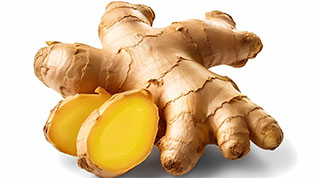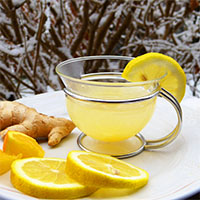


 GINGER TEA
GINGER TEA Preparation For each cup, peel a 2.5 cm piece of ginger and slice it thinly. In a pot, cover the ginger with fresh water, bring it to a boil, and then let it simmer on low heat for 10 minutes. Add a slice of lemon to the cup and pour the ginger tea, including the ginger slices, into the cup. The tea can be enjoyed hot, warm, or cold. You can also eat the ginger slices.
• Short cooking time (5–10 minutes): The tea will have a mild spiciness and remain fresh and aromatic. Gingerols are still dominant, giving the tea a pleasantly pungent flavor.
• Longer cooking time (over 10–15 minutes): If the ginger is cooked longer, the gingerols begin to convert into compounds called shogaols. These are produced by heating and have a sharper, more intense flavor, meaning the tea can become spicier over time.
Gingerols and Shogaols: What’s behind them?
• Gingerols: Gingerols are known for their anti-inflammatory, digestive, and antioxidant properties.
• Shogaols: When ginger is heated for a longer time, gingerols transform into shogaols. These have a more intense, sharper taste and are often associated with stronger blood circulation and antispasmodic effects.
Ginger (Zingiber officinale) is one of the most commonly used spices worldwide and has been utilized in traditional medicine for thousands of years. This rhizome contains numerous bioactive compounds, with gingerol being considered the main component.
Historical Significance
Ginger has a long history as both a remedy and a spice. It was used as a tonic over 5,000 years ago in India and China. In ancient Rome, it was highly valued for its medicinal properties. Even into the Middle Ages, ginger remained a coveted trade commodity.
Active Ingredients and Constituents
The root contains at least 115 different components, including gingerols and shogaols. The concentration of these substances varies depending on origin and processing method. Particularly, gingerol is credited with many health benefits.
Health Benefits
1. Antioxidant Effects : Ginger exhibits strong antioxidant properties that can protect against oxidative stress. It reduces lipid peroxidation and increases levels of protective antioxidants in the body.
2. Anti-inflammatory Effects :
Studies suggest anti-inflammatory effects, especially in arthritis and other inflammatory conditions. The active ingredients inhibit inflammatory mediators like COX-2.
3. Anti-nausea Effects :
Ginger is particularly well-known for effectively preventing and treating nausea and vomiting, whether due to pregnancy, chemotherapy, or motion sickness. It is at least as effective as Vitamin B6.
4. Cancer Prevention :
Research indicates potential cancer-preventive properties, especially concerning colon cancer. Ginger compounds can inhibit tumor cell growth and induce apoptosis (programmed cell death).
5. Cardiovascular Health :
Ginger can help lower cholesterol levels and improve lipid metabolism, thereby reducing the risk of cardiovascular diseases.
6. Liver Health Protection :
Ginger shows promising effects in preventing and treating alcohol-induced liver damage. Studies have shown that ginger can mitigate ethanol-induced hepatotoxicity by suppressing oxidative damage. It is particularly effective in reducing lipid peroxidation in the liver and protecting reduced glutathione (GSH) levels. In rats treated with ethanol, ginger significantly reduced harmful oxidative consequences. These hepatoprotective properties make ginger a promising natural option for supporting liver health.
Other Applications
• Diabetes management
• Asthma treatment
• Improvement of brain function
• Support for digestive issues Safety and Side Effects Ginger is classified by the FDA as "generally recognized as safe." Studies show minimal negative effects, even during pregnancy. However, caution should be exercised when taken concurrently with anticoagulant medications.
Usage and Preparation
Ginger can be enjoyed in various forms:
• Fresh
• Dried
• Powdered
• Candied
• As tea or extract
Dosage recommendations vary depending on the intended use. For most therapeutic effects, 1-4 grams per day are recommended.
Conclusion
Ginger is a remarkable natural remedy with a variety of health benefits. Although further research is needed to fully understand all mechanisms of action, current findings support its efficacy and safety for many applications. From alleviating nausea to cancer prevention, ginger offers a broad spectrum of health benefits.
Closing
Remarks Ginger is far more than just a popular spice in our kitchens. This special root combines millennia-old healing wisdom with modern scientific insights into an impressive natural remedy. From alleviating nausea to anti-inflammatory effects and cancer prevention—the versatility of ginger is remarkable. While further research is still needed to fully understand all its mechanisms of action, the existing evidence supports its safety and efficacy for numerous applications. In a time when more and more people are seeking natural health solutions, ginger proves to be a true gem of nature—a spicy medicine that enriches both our palate and our body. Its "powerful" properties deserve to be further explored and appreciated in modern healthcare.
